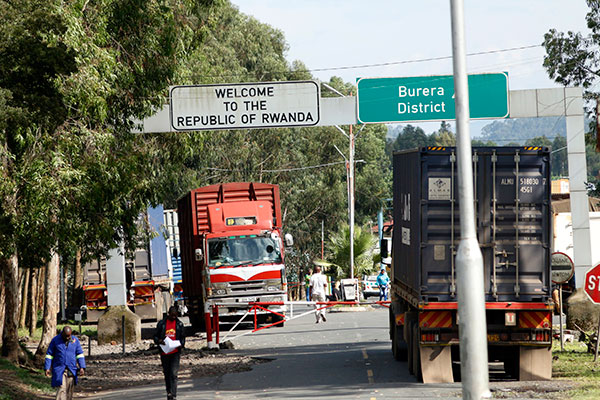It is now over two weeks since Rwanda closed her border with Uganda blocking traders trying to take their products to the markets in Rwanda and also stopping Rwandan citizens from crossing to Uganda.
The border row started as a minor issue with the Rwanda Revenue Authority claiming that they were trying to expand the border road hence stopping heavy tracks from crossing into Rwanda. However, what was referred to as road works at first, it has culminated into more complicated issues.
There has been a long-standing diplomatic feud between Uganda and Rwanda with both countries accusing each other of interfering in their affairs and now it has been escalated with the border closure.
The closure of the border has so far had far-reaching effects on local communities especially to individuals who used to do business across the border. The most affected include traders and transport agents. Others victims include low-skilled workers like cargo porters and money changers who have been left idle with no work.
When the Rwanda government issued a warning to its citizens not to travel to Uganda, it left those who trade near the border with almost no business. As Rwandese are stopped from entering Uganda, Ugandans are also afraid of crossing into Rwanda fearing what may happen next.
The crisis has also led to the issue of food shortage, especially on the Rwanda side. The Rwandans who live just across the border used to buy their basic foodstuffs like tomatoes, potatoes, and fruits at the border post of Cyanika which is currently closed. They now have to use illegal shortcuts and pathways in fear of arrest by the Rwandan security officials. Those who have been commuting to Uganda for health and education services have also been affected.
The big market days in the border towns on the Ugandan side have also been hit severely without the Rwandan customers bringing activity to a halt.
Bigger businesses have not been spared by the crisis as trucks carrying goods to Rwanda and other countries like DRC and Burundi have either been delayed, diverted to use longer routes via the Mirama hills or completely stopped at some border posts.
The data from the World Bank shows that Rwanda is Uganda’s third biggest market after Kenya and South Sudan importing goods worth about $180m while Uganda imports goods worth $10m from Rwanda.
Response to the crisis
While the Uganda authorities are calling on their Rwandan counterparts to let trade return to normal, the government in Kigali is trying to ensure that its citizens do not suffer shortages and high prices.
Rwanda-Uganda relations
The two heads of Uganda and Rwanda are known as long term allies and friends. Both president Yoweri Museveni and his Rwanda counterpart Paul Kagame helped each other to come to power through rebellion. A group of Rwandan Patriotic Front (RPF) including Kagama fought alongside Museveni’s National Resistance Army (NRA) in the 1980s in a struggle that brought Museveni to power in 1986. In return, Museveni also supported Kagame and his team in their struggle to liberate Rwanda in the 1990s.
Tension setting in
In recent years the two countries have fallen out despite the strong familial and business ties between them. Some of the recent confrontations between Uganda and Rwanda include facing off in a military crisis in the Democratic Republic of Congo in 1990s. This standoff originated from the two countries finding themselves supporting rival rebel groups that were trying to oust former DRC president Laurent Kabila.
More than two weeks back the Rwanda Revenue Authority stopped some cargo from Uganda from crossing the border claiming that there was construction work going on at the border post of Katuna though they did not explain why other crossings were halted. Later on, it emerged that the issue was more than mere road works as deeper grievances were revealed.
Rwanda has issued a warning to her nationals not to travel to Uganda saying that some of her nationals have been arrested, detained, tortured and then deported by Ugandan officials without clear reasons.
According to Rwandan officials, more than 900 Rwandans have been deported since January 2018 and they allege that about 106 are still in detention.
Rwanda’s foreign minister Mr. Richard Sezibera has accused Uganda of supporting and hosting rebel groups trying to oust the Rwandan government. He added that Rwanda is not interested in interfering with Uganda’s intern issues.
Response from Ugandan
The government of Uganda has dismissed all the accusations from Rwanda as false. The government says that they have not identified any specific grievances against Rwanda despite the continued circulation of rumors in the local media that Rwanda is trying to compromise Uganda’s security.
Among the specific cases pointed out include that of Uganda’s former Inspector General of Police Gen Kale Kayihura who was arrested in June last year. He was charged with cases that included aiding and abetting the kidnap and repatriation of Rwanda nationals. He denied the allegations and he was later released on bail.
There have been recent cases involving arresting and deporting Rwandan nationals from Uganda after being accused of espionage. The most famous of these is that of MTN Uganda former employee, Annie Tabura who was arrested and deported in January this year after being accused of undermining Uganda’s security. However, Ugandan officials say that all of those who were arrested and detained were taken through a proper judicial system.
As it stands now, the major impact of this crisis is felt by Ugandan traders who are not able to do business in Rwanda and on the side the Rwandans who cannot access food, healthcare, and education that they were previously getting from Uganda.












